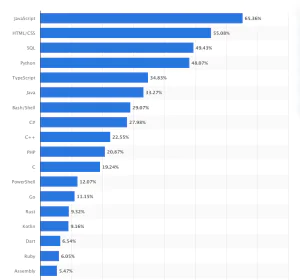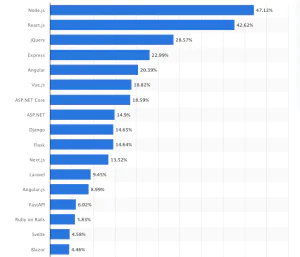Your expertise lies in which programming language? This question seems familiar, right? As a developer, you might have encountered this question a number of times. All the top mobile app development company, or web app development companies; in fact, the entire IT sector revolves around the versatility of data science skills.
Developers often face FOMO (Fear of More Options) when choosing the best programming language. Or to put it this way, there is nothing like one best language. The market is vast and highly competitive. Here the point is, which programming language suits your app development requirement the best?
So, whether you are a newbie in the world of codes or a coding veteran, this blog will help you choose a programming language that suits your skill set the best.
Moving forward with a brief introduction,
What are Programming Languages?
Programming languages refer to formal coding languages specifying a set of instructions to direct computing devices into producing a wide variety of outputs.
How many Programming Languages are there?
There are over 700 programming languages. We believe in the developer’s choice. Here we have the latest survey report from Statista that highlights the programming languages most preferred by developers in 2022.

What is the difference between a Framework and a Programming Language?
A framework is a platform that helps you to build an application and deals with app architecture. Whereas a programming language helps you write the application code. It deals with the syntax and semantics of an app. A framework incorporates the collection of pre-written codes and templates within its libraries.
Flutter remained the most popular programming framework for mobile app development in 2022. Let us have a look at the Statista report that represents;

These statistics have surely given you an idea of the current market. Now, coming to the point, which programming language should you choose to start app development? Let us have an overview by discussing some majorly impacting pros and cons of programming languages.
What are the Pros and Cons of different Programming Languages:
1. Java:
Java is a class-based, high-level, object-oriented programming language with very few implementation dependencies.
Applications of Java:
Java is used to build;
- Mobile apps
- Web apps
- Desktop-GUI apps
- Enterprise apps
- Scientific apps
- Gaming apps, etc.
Pros of using Java:
- Java is a straightforward language. It is easy to learn, program, compose, investigate, and integrate with Java as compared to other programming languages.
- Java is item-oriented and allows you to make reusable codes.
- Java code is stage-independent and runs on any computing device pre-installed with JVM.
- As Java is a disseminated language, it helps you improve your presentation and proficiency.
- The main plus point of Java is that it is highly secure.
- Java distributed memory in two sections: stored memory and stacked memory. So, whenever you pronounce a variable, JVM calls it from the pile space or the stack. Hence, retaining and re-establishing information is easy with Java.
- The multithreading potential of Java helps you perform multiple tasks simultaneously.
- Java offers automated garbage collection
Cons of using Java:
- Java is slow and requires huge memory space
- Java has verbose codes with long complex sentences
- Memory management with Java is a bit tricky
- The look & feel of GUI apps written in Java is not similar to native apps.
2. JavaScript:
JavaScript is a high-level, multi-paradigm, object-oriented programming language which follows ECMAScript protocols.
JavaScript Applications:
JS is used to build
- Client-side web apps
- Server-side web apps
- Mobile apps
- Desktop apps
- Gaming apps
- Web-development
- Presentations and digital art
- Flying quadcopter
- IoT apps (IoT.js), etc
Pros of using JavaScript:
- JS is comparatively fast and smooth.
- JS renders consistent results across all browsers.
- JS has large community support.
- JS has gained much popularity owing to the ease of learning & implementation.
- You can make rich interfaces with JS
- Client-side JS is very fast and renders quickly on the client-side browser.
- You can build a fully functioning app from front-to-back, by solely using JS.
Cons of using JS:
- JS DOM is slow and cannot render fast with HTML
- A single error in JS code can stop rendering the entire website
- It is difficult to build large applications with JS. For this, you can render a TypeScript overlay.
- For big-size front-end projects, the configuration becomes tedious and requires many tools to create a properly functioning environment.
- Your JS code is visible and accessible to everyone.
- Different browsers interpret JS differently. So, it becomes difficult to read and write cross-browser codes with JS.
To overcome the cons of JS you can use TypeScript. It is a superset of JavaScript that adds static typing to the language. It is designed to build large applications that transpile to JS.
Java and JavaScript remained the most demanded programming languages in 2022. Over 40% of recruiters from top software development companies across the globe were seeking to hire Java developer and JS developers.
3. Python:
Python is a high-level general-purpose programming language that supports multiple programming paradigms (including structured, object-oriented, and functional).
Owing to its simple and easy syntax, Python is the best programming language for beginners.
Python Applications:
- Web development
- Mobile app solutions
- AI/ML and robotics models
- Desktop GUI development
- Game development
- Enterprise-grade apps and Business apps
- Educational apps
- OS development
- Programming language development (Swift, CoffeeScript, Cobra, etc)
- High-level network programming and scientific computations
- Data science and data analytics
- Audio-video apps
- CAD apps
- Console apps, etc/
Pros of using Python:
- You can easily read and learn Python
- Python facilitates dynamic coding. So variable declaration is not required.
- Python offers free-to-use open-source code libraries
- Python is platform-independent and a single code renders seamlessly across different OS (Windows, Linux, Mac).
- It has a wide range of libraries having multiple modules, packages, and templates.
- Python is extensible and can be integrated with other programming languages.
- Python is a pro at memory management and helps in building large projects
- As it focuses more on algorithms rather than coding, Python guarantees increased productivity.
- It has a large community support.
- MAJOR BENEFIT: Python is an interpreted language that follows a step-by-step debugging process. While you write the code, it gets executed line-by-line. As soon as an error occurs, the execution stops passing the error to the console.
Cons of using Python:
- Python is slower as compared to C or C++
- Python is weak at mobile app development
- Its memory consumption is high
- The database access layer in Python is a bit underdeveloped and primitive.
- Runtime errors make testing complex and tedious.
- Python is sure to pamper you. Developers enter a comfort zone while using Python. This may impact their learning skills in the long term.
Python remained in limelight in 2022, with 38% of recruiters from top software development companies seeking expert Python developers.
4. PHP
PHP (Hypertext Preprocessor) is a general-purpose scripting language used to write application codes that run seamlessly on web servers independent of online browsers. With its CLI capabilities, it can be used to build amazing client-side GUI.
PHP Applications:
- Web pages and Web-based apps
- Web content management systems
- e-commerce apps
- GUI apps
- Graphic designing and image processing
- Data analytics and Graphical representation
- Create flash elements, etc.
Pros of PHP:
- PHP is an open-source, free-to-use, easily available and accessible language.
- Its major benefit is fast loading even at low network connections.
- PHP is platform-independent and can render across multiple OS (UNIX, Windows, Linux, etc).
- PHP apps can be easily loaded and quickly connected to the database.
- You can easily learn and implement PHP without any complexity.
- PHP code stays stable for long periods with continuous support for newer versions
- Its code is reusable and can be managed easily.
- Powerful PHP library support and in-built database connection modules make development easy and fast.
- PHP is flexible, scalable, and well-integrated with other programming languages.
Cons of PHP
- Security is a major issue with PHP
- It lacks debugging tools that help in identifying errors or warnings at an early stage.
- Code management is difficult.
- It is resistant to changes and modifications.
- PHP is not suitable for building big-sized content-based applications.
5. C-Family Languages:
C/C++:
C is a general-purpose, middle-level programming language and C++ is ‘C with Classes.’
C/C++ Applications:
C/C++ is used to build;
- Operating Systems
- GUI apps
- Database management software
- Embedded systems
- Gaming apps
- Cloud or distributed systems
- Libraries and Switches
- Advanced computation graphics
- Programming languages
- Assemblers, text editors, drivers, interpreters, etc.
Pros of C/C++:
- You can use C for building system-level codes as well as codes for embedded devices.
- Many programming languages are built on the syntax of C language.
- You can easily add the functions to the C library.
- For networking, gaming and server-side applications, C++ is the best choice.
Cons of C/C++:
- Errors are not identified at the initial stage. They only appear after code compilation. Hence debugging becomes complex and tedious.
- Code management is difficult
C#:
C# or CSharp is a high-level, object-oriented, structured programming language. You can build robust .NET apps with C#.
Applications: C# is used for building web apps, game apps, workflow apps, web services, etc.
Pros of C#
- Fast app development with a clear program structure.
- Code compilation and execution is quick with C#.
- C# is easy to learn and supports modern functionalities
- As compared to procedure-oriented languages, C# makes code development and management easier.
- C# supports automated garbage collection.
Cons of C#:
C# lacks flexibility. You need a pre-installed .Net framework as C# is completely dependent on Microsoft.Net.
End Note:
Businesses are considering to hire dedicated developers for different project requirements.
So instead of juggling with too many languages at a time, select one language and master it. Different types of applications demand different skill sets. So, focus on the application you are working on, choose a domain, understand its requirements and then select a programming language to kick-start application development.
We at Whitelotus Corporation are one of the top web & mobile application development company. We own a versatile team of app developers with advanced level technical knowledge. We can help you throughout the app development process, including pre-and post-development support. You can even call us for a FREE consultation with our tech expert.
Also Read:
- MBaaS Can Help You Create Best Mobile Applications for Business – Know The Reasons.
- How Much Does it Cost to Develop an On-Demand Service Application?
Author

Sunil is a result-orientated Chief Technology Officer with over a decade of deep technical experience delivering solutions to startups, entrepreneurs, and enterprises across the globe. Have led large-scale projects in mobile and web applications using technologies such as React Native, Flutter, Laravel, MEAN and MERN stack development.
View all posts









